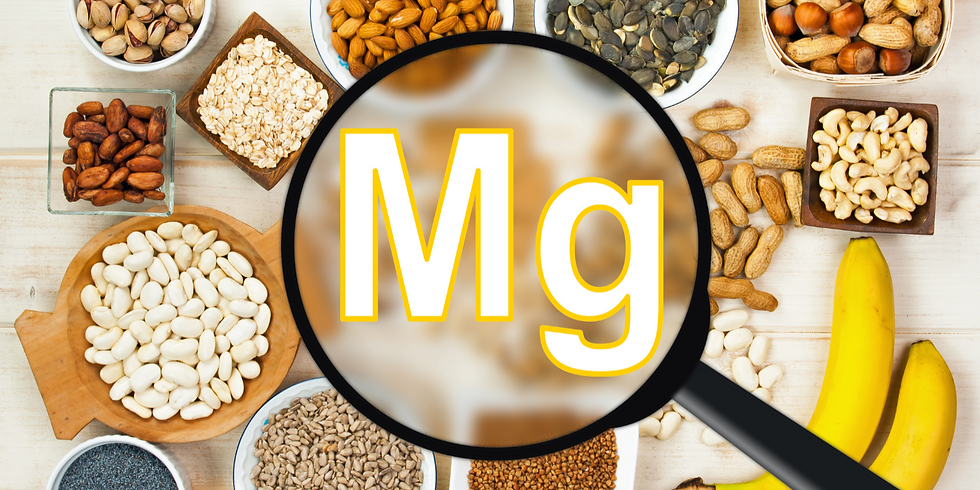Can You Take Too Many Supplements? Nutritionist Explains
- Katie Bailey, MS, RD, LD, FNC

- Sep 3
- 6 min read
Are you someone who has a full shelf full of supplements, maybe even a drawer or two, and you're wondering, can you actually take too many?
Well, supplements are absolutely beneficial. They can help us to fill gaps in our diet. They can support gut function and healing, and they can help us to correct specific deficiencies or imbalances. For example, supplementing with specific forms and dosages of magnesium can help to calm down our nervous system, ease muscle cramps, as well as promote better sleep.
A high percentage of the population have suboptimal magnesium levels, and our food supply generally doesn't have enough magnesium content for many different reasons, and multivitamins often have insufficient at levels of magnesium in them as well. So this is where supplementation can be extremely beneficial.
The Problem with Taking Too Many Supplements
Now, here's the part that most people miss. More is not necessarily better. It's important to really consider which supplements you choose to include or work with a practitioner that can really fine tune your supplement regimen and determine which supplements you actually need. Taking too many supplements or taking extremely high dosages of certain supplements can stress multiple systems in the body. They have the potential to cause side effects.
Potential Risks of Over-Supplementation
Side Effects from High Doses
Now, generally, supplements tend to have less side effects than medications, but there's still the potential for side effects, things like nausea, diarrhea, or constipation, as well as stomach pain. These things can happen with excessive dosages of certain nutrients, things like vitamin C, iron, magnesium, or zinc.
Vitamin Toxicity
There's also the possibility of toxicity. So high doses of our fat-soluble vitamins, which are vitamins A, D, E, and K, can accumulate over time and become toxic.
Liver Stress and Detox Burden
Another thing to be aware of is liver stress. So the liver processes everything that we ingest, so not just toxins, but also our nutrients as well as herbals. And so for instance, like talked about before, our fat soluble vitamins can actually accumulate in the liver causing damage over time.
Now, another thing that can happen is the liver could have an increased detox burden. So a lot of supplements contain things like additives and fillers or binders. Now these also have to be detoxed through the liver. The more supplements you have, the higher toxic burden or detox burden the liver may have, depending on the supplements that you choose.
Nutrient Imbalances
Another thing to be aware of are nutrient imbalances. So most of the nutrients in our body, or a lot of them rely on ratios so they work together. And so overloading on one nutrient can cause deficiencies or imbalances in others. So for instance, taking too much zinc when you don't need it can lead to a copper deficiency.
Dangerous Interactions
And then lastly, the potential for interactions. So there are supplements that are going to interact with certain other medications or even certain supplements. So things like if you're taking excess dosages of K is going to interact if you're taking an anticoagulant. So the more supplementation that you have, the higher the chance of interactions. So yes, supplements can be really powerful tools, but there's always a time and a place for them and they should be reevaluated routinely.
Next, we're going to discuss signs that you may be taking too many and how to reassess your current supplement regimen. But first, I'm Katie Bailey. I'm a registered dietitian at Flusso Nutrients where we provide supplement education and professional quality supplement options for you to make the world of nutrition supplements a little bit easier to navigate. As always, be sure to check with your main nutrition literate healthcare provider before starting anything new. As we can't know your full medical history to provide a personalized recommendation for you.
So without further ado, let's jump into today's topic.
[Video Transcript Below + Supplement Links Discussed In Video]
Signs You’re Taking Too Many Supplements

The first is just sheer quantity. If you're taking 10, 15, 20 supplements with no real clear plan, then it's time to reassess. Another thing is overlapping ingredients. So you may be taking a multivitamin, an energy support, immune support, hair, skin, and nail supplement. And a lot of these supplements contain a lot of the same ingredients. So is that really necessary? You need to consider that.
Another thing to be aware of are new or worsening symptoms. So nausea, digestive upset, fatigue, or headaches can happen when you're taking too much of some nutrients. So thinking about when I take this supplement, am I feeling better or am I feeling worse? If you're feeling worse, is this something that we need to be taking? Should we consider something else or do I even need to be taking it?
And then the biggest one is you don't know why you're taking half of the supplements you're taking anymore. So if you can't clearly say, I'm taking this supplement because I tested low in vitamin D and I'm going to recheck in three months and see what my levels are, or I'm on this digestive support for so many months and I'm going to reevaluate at this point, then it's really time to simplify your routine.
Food Should Be the Foundation
Now I want to mention that food is always the foundation. So supplements are temporary tools that we use for targeted support while we really address root causes through lifestyle, nutrition and healing. And there are definitely times where we use multiple supplements and they're necessary in order to correct deficiencies or really work on healing or fixing imbalances.
Questions to Reassess Your Supplement Regimen
Now I want to give you a few questions to ask yourself when reassessing your current regimen for supplements.
The first is, do you still remember why you started that supplement to begin with?
Are your symptoms improving?
Are they staying the same or are they getting worse?
Have you retested to confirm that you still need that supplement?
So for example, if you started taking vitamin D because your levels are low, have you retested it so many months later to see if you even still need that supplement?
Are there any overlaps in nutrients in your supplement regimen?
Are you noticing any new symptoms after starting these supplements?
Are your lifestyle and diet choices now covering what these supplements were meant to fix?
And lastly, could you simplify this regimen and still meet your goals?
Why Supplement Quality Matters
Now, it's important to remember that not all supplements are created equal, and this is not highly regulated. So it's always important to choose high quality brands that are third party tested to ensure that you're actually getting what you're paying for. If not, you could be spending a ton of money on supplements that are not providing you with much benefit. And in practice, I've actually seen clients that are taking the right form or taking the right dosage of a supplement, but a lower quality brand. And when they switch to a higher quality brand, they notice a significant difference in how they feel.
So quality really does matter. And if you're looking for or a need of quality supplements, I'll have a link below in the description box.
Final Thoughts – Simplify and Reassess
Now, supplements can be an incredible tool for filling in the gaps and supporting your overall health, but more is not always better. The key is choosing high quality supplements that are right for your body and making sure they're actually working for you. Remember, your health is not static, so your supplement regimen shouldn't be either. You should reassess every few months. Check for overlapping ingredients and make sure that you still need each one. That way you're supporting your body instead of overwhelming it.
That's it for today's video. If you liked this video, please hit the like button and subscribe for more nutrition videos. Let us know in the comments if you have any questions. And if you're interested in working with our clinic, you could click the link here to schedule an initial appointment. We do take insurance. You can find more information about that on our website.
Thank you for watching. I'll see you next time. Bye.
Check out the high-quality supplements we discussed in this video - links below for your convenience!
ALL PROFESSIONAL QUALITY SUPPLEMENTS:




Comments